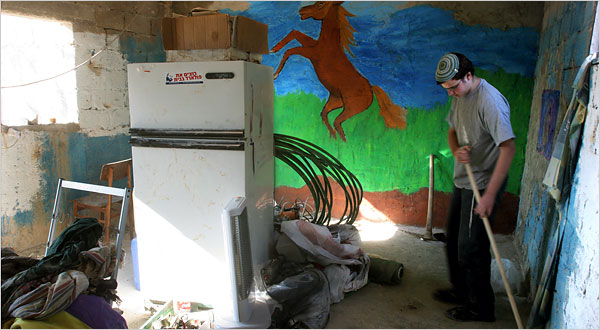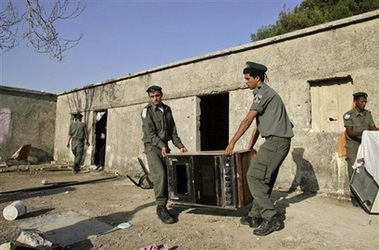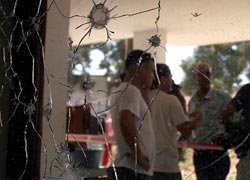|
|
||||
|
|
||||
| Home | Contents | Site Map | Links | Search |

|
|
|
One of a group of Israeli youths who have occupied and are renovating a house that Palestinians say they own. (New York Times)
|
December 12, 2007 - Israel too has its religious fundamentalists. They are not as deadly as the ones on the Arab side. With extremely rare exceptions, they do not engage in mass murder. They don't blow up people and then say God is pleased. Nevertheless, they are a threat not only to the Palestinians whose land they want to occupy, but to the peace process and to Israel itself.
"Outposts" are small Jewish communities set up in the West Bank without official approval by the Israeli government and in violation of Israeli law. One of these is Shvut Ami in the northern West Bank. The name literally means "the return of my people." It indicates the religious ideology behind the project: Jewish settlement of the land in fulfillment of the divine commandment as recorded in the Bible.
On the outpost of Shvut Ami there is an old stone house, which some young Jewish settlers are renovating. The problem is, the house belongs to a Palestinian family, the family of Abd al-Ghani Salah Amar, who built it in 1963, ten years before he died. In addition to the house, Mr. Amar's estate includes 17 acres of land, with hundreds of olive and almond trees. Badriya Amar, Mr. Amar's daughter, a 61-year-old widow, manages the estate, but can take little advantage of it. When she tries to visit the orchards to pick some olives, the settlers chase her away.
Mrs. Amar filed a complaint with the Israeli authorities, charging the settlers with trespassing. Her complaint is under review, and she does have an Israeli lawyer to represent her. The lawyer criticized the weak response by Israeli authorities and stated: "Shvut Ami is a chronicle of failure of law enforcement." Meanwhile one of the young settlers appealed to a higher authority: "God gave this to us. Now that we’re here, I don’t think we’re going to move."
Shvut Ami was established last October, on the holiday of Sukkot. Israeli police have tried several times to evacuate the settlers, but they keep coming back. Who cares about human laws when God is on your side?
When Shvut Ami was founded, a rabbi proclaimed: We will "go from strength to strength regarding the commandment of settling the Land of Israel... We must go from one strength, namely, the communities and towns that have already been built in the land, to the next strength - i.e., the hilltops whose construction and development are being held up for various strange reasons." In a grotesque parody of Psalm 20:8 he continued: "Our response is: 'Some by Supreme Court petitions, and some by terrorist attacks, but we in the Name of the Lord our God will call!' - the God Who has commanded us to come and inherit the land that He promised Abraham, Isaac and Jacob and their descendants after them." Thus the rabbi draws a parallel between anti-settlement court decisions and terrorism!
Shvut Ami is one symptom of a larger problem. Over 100 of these outposts have been established over the past several years, with the purpose of making it impossible for Israel to transfer the land to the Palestinians to form their own state. Israel has promised to dismantle about two dozen of these outposts, and even that has yet to be fulfilled.
The settler ideology is not the dominant one in Israeli politics. It is not what most Israelis voted for in the last election. Yet it has enough support to make a serious dent in Israel's efforts to comply with its Roadmap obligations.
The Israeli government succeeded in withdrawing from all of the settlements in Gaza in spite of strong opposition from the settler faction, but has failed to apply similar pressure on the West Bank outposts. It would not be easy, since no sooner are the outposts destroyed than they are rebuilt, and significant manpower would be required to keep them permanently closed. Nevertheless, Israel's weak response to the outposts is not only unjust, it is suicidal. The settler activists see this weakness and feel emboldened: as one said, "We come back straight away, as soon as [the police] have gone. They come every week for half a day. It doesn’t bother us so much." In addition, the government's reluctance to offend these activists and their supporters increases Israel's diplomatic isolation and erodes Israel's moral authority.

|
|
|
Israeli border police officers remove an oven from a house in the unauthorized Jewish settlement outpost of Shvut Ami, Thursday, Nov. 15, 2007. (AP)
|
Any religion that sets up one group of people as superior to another is a dangerous anachronism. Anyone who practices such religion is flirting with self-destruction. We can see the damage radical Islam, with its hatred of the unbeliever, has done throughout the Muslim world, and especially how it has set back the Palestinian quest for a healthy and independent society. Settler Judaism, though usually not as bloody, still poses a similar threat to Israel. Settler Judaism has already thwarted Israel's efforts to honor the Roadmap. Israel's first obligation under the Roadmap was to dismantle the outposts. It failed to accomplish this. Annapolis is based on Roadmap principles, and the same thing is likely to happen once again.
If the peace process fails, the biggest loser will be Israel. The Palestinians are already using the rhetoric of democracy to justify their refusal to recognize Israel as a Jewish state. Now the outpost activists want to scuttle any chance for a two-state solution. What will happen if the two-state solution fails? The only alternative is one state. And the rhetoric will be, one democratic state. One person, one vote. With two states gone forever, Israel cannot succeed in disenfranchising the Palestinians indefinitely. The parallel with South Africa, so far an unjust imposition on a totally different reality, could actually become credible. If Israel allows its extremists to wipe out the last chance for two states, it won't be able to withstand a campaign for Palestinian rights within the remaining one state. International pressure will increase, American support will wane, and Israelis themselves will tire of the stresses of maintaining control over the West Bank. A tipping point will become inevitable.
Finally - but most importantly - exclusivist religion must be repudiated because it is morally wrong. It is morally wrong when Muslims do it, when they push the idea that every acre in the Middle East belongs exclusively to them, even to the point of fabricating history to deny that there ever was a sovereign Jewish presence anywhere in the land before now. It is morally wrong when Jews do it, claiming that the land is theirs by divine right, even the parts now populated by others. We cannot turn back the clock to the days of the Qur'an, nor can we turn it back to the days of Joshua. Those who try are playing with spiritual fire. They will bring down destruction not only on themselves but, unfortunately, on all those around them.
Lately it is often said that one cannot criticize Israel, that it's some sort of taboo enforced through a powerful Jewish cabal. Don't anyone dare criticize Israel, or the Jewish Lobby will get you in your sleep!
It's hard to understand how anyone who reads a newspaper can believe this. Israel is subject to more public criticism than any country on the face of the earth. I just criticized Israel myself. I believe I will live to see tomorrow.
Self-criticism is indeed healthy, up to a point. But self-criticism is bound to be abused when only one side practices it.
You will virtually never find self-critical articles on pro-Palestinian web sites. You will rarely, if ever, find it on the Muslim side in Muslim-Jewish dialogue. I have witnessed many of these dialogues, too many. In a lot of them, I see members of the Jewish side trying to find a common center, confessing their own faults, criticizing Israel's policies. I have never seen such self-criticism from the other side - and I mean never. The dominant view among Palestinians is that they are victims, that they deserve every concession but have no obligation to concede anything to Israel, that Israel is the oppressor and is always in the wrong, that Palestinians themselves bear no responsibility for any of their problems, and that Jewish confessions of guilt prove that all of these assumptions are correct.
The international community has been a tremendous enabler in this regard, reinforcing notions of Palestinian helplessness and victimhood, through rallies of solidarity with the Palestinians, abuse of the U.N., and boycotts and divestment campaigns against Israel. All of this sends a powerful message to the Palestinians: You don't need to grow up. You don't need to take responsibility for yourselves. We expect only Israel to behave like a civilized nation, so don't feel under any pressure. And so Palestinians by and large cannot see anything they have done wrong. Why should they, when they're not forced to look at themselves? Palestinians demand compensation from Israel, totally oblivious to the ironic arrogance of such a demand after so much spilling of innocent Jewish blood.

|
|
|
Damaged caused by a Qassam rocket next to a Sderot school earlier this year. (Ha'aretz)
|
Here is the Hamas response to Annapolis: this morning they fired a salvo of at least 17 rockets into southern Israel. There were casualties. Why does this story get so little attention? Why is there no pressure on the Palestinians to honor their own Roadmap commitments? And how does treating Palestinians not just with a lenient double standard, but with no standard at all, contribute anything to peace?
Some who read this article may say, "Ah, he's criticizing Israel, he says Israel's behavior is self-destructive, so here is more proof of Israel's illegitimacy and more vindication of the Palestinians." Well, if Israel is doing something stupid, immoral, and self-destructive, it does not help to keep silent about it. But unless both sides show a willingness to criticize themselves, there will never be peace. If Israel's self-criticism - and there is a lot of it, on all levels of Israeli society - is constantly interpreted as supporting and excusing the Palestinians, then Israel's own self-examination will have little value, will be seen as self-destructive, and will disappear as both sides harden. Israelis' willingness to criticize themselves must be seen as an invitation and a challenge to Palestinians to do the same, and not as a blank check for Palestinian misbehavior. So far Palestinians have not stepped up to the challenge, at least not in numbers that have any significance, and certainly not in any stratum of their leadership.
One hand clapping cannot make a sound, and can certainly not make peace.
Sources:
Azoulai, Yuval. "IDF, Border Police Evacuate and Dismantle Two W. Bank Outposts." Ha'aretz, October 1, 2007.
Fendel, Hillel. "Shvut Ami Destroyed; Rebuilding Underway." Israel National News, December 12, 2007.
Kershner, Isabel. "Young Israelis Resist Challenges to Settlements." New York Times, December 8, 2007.
Ravid, Barak. "Sderot Mayor Resigns in Wake of Rocket Barrage from Gaza Strip." Ha'aretz, December 12, 2007.
Israeli-Palestinian Conflict:
Peace with Realism